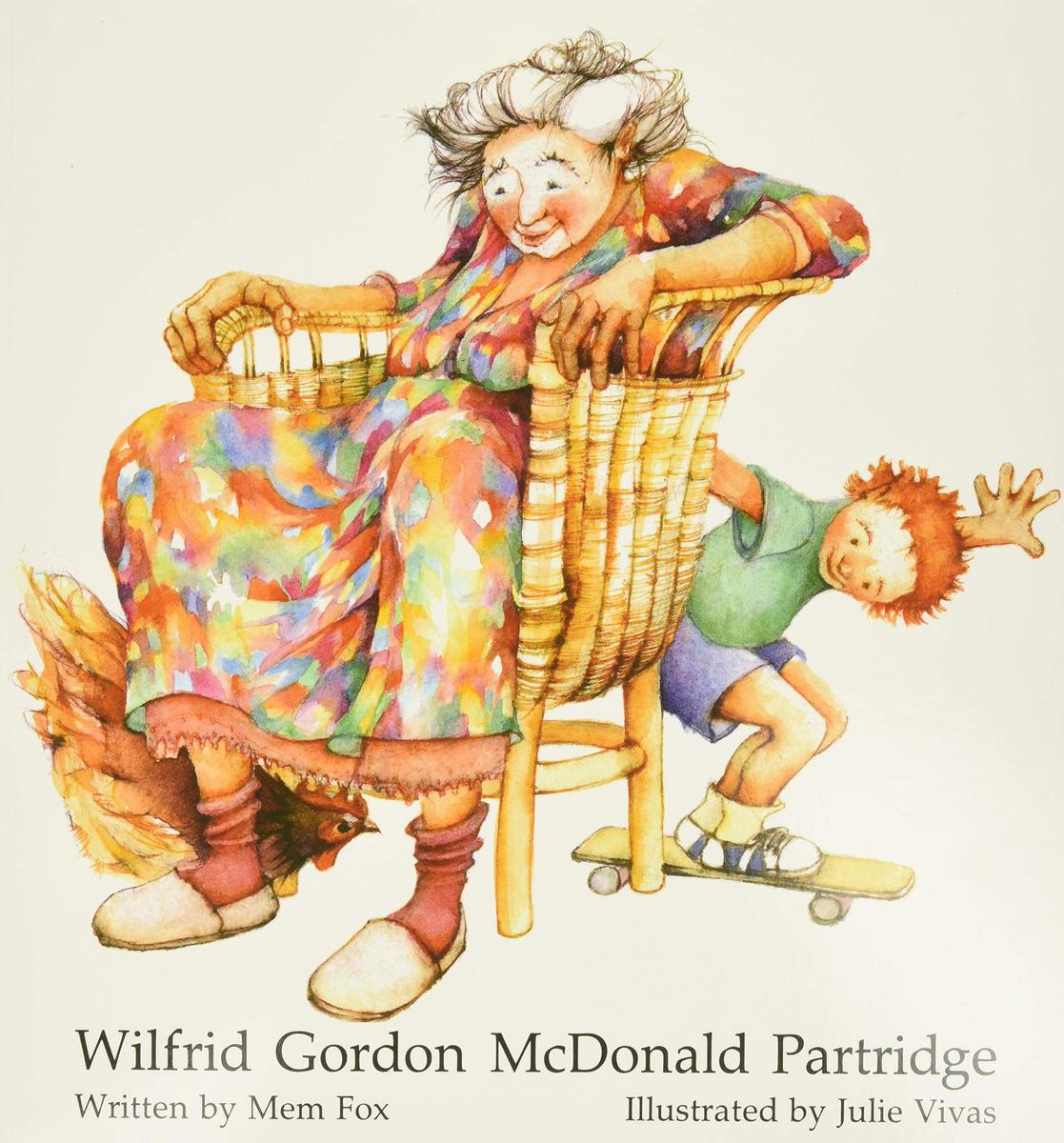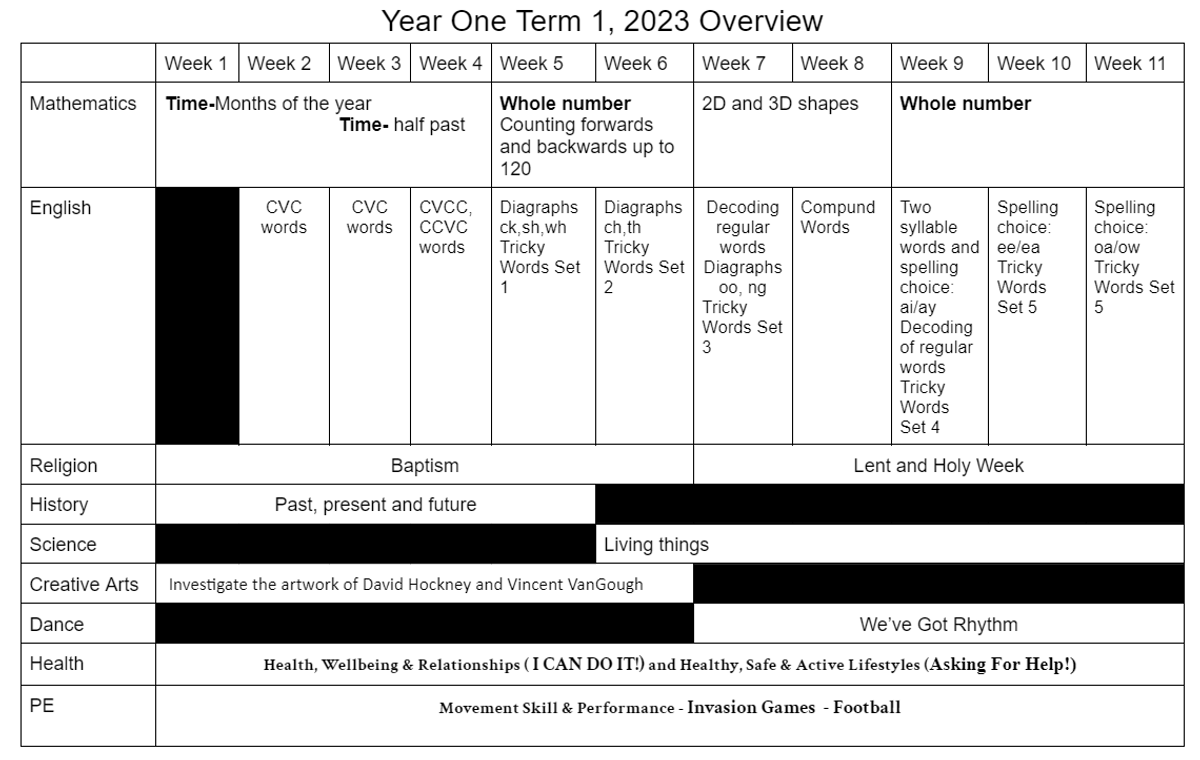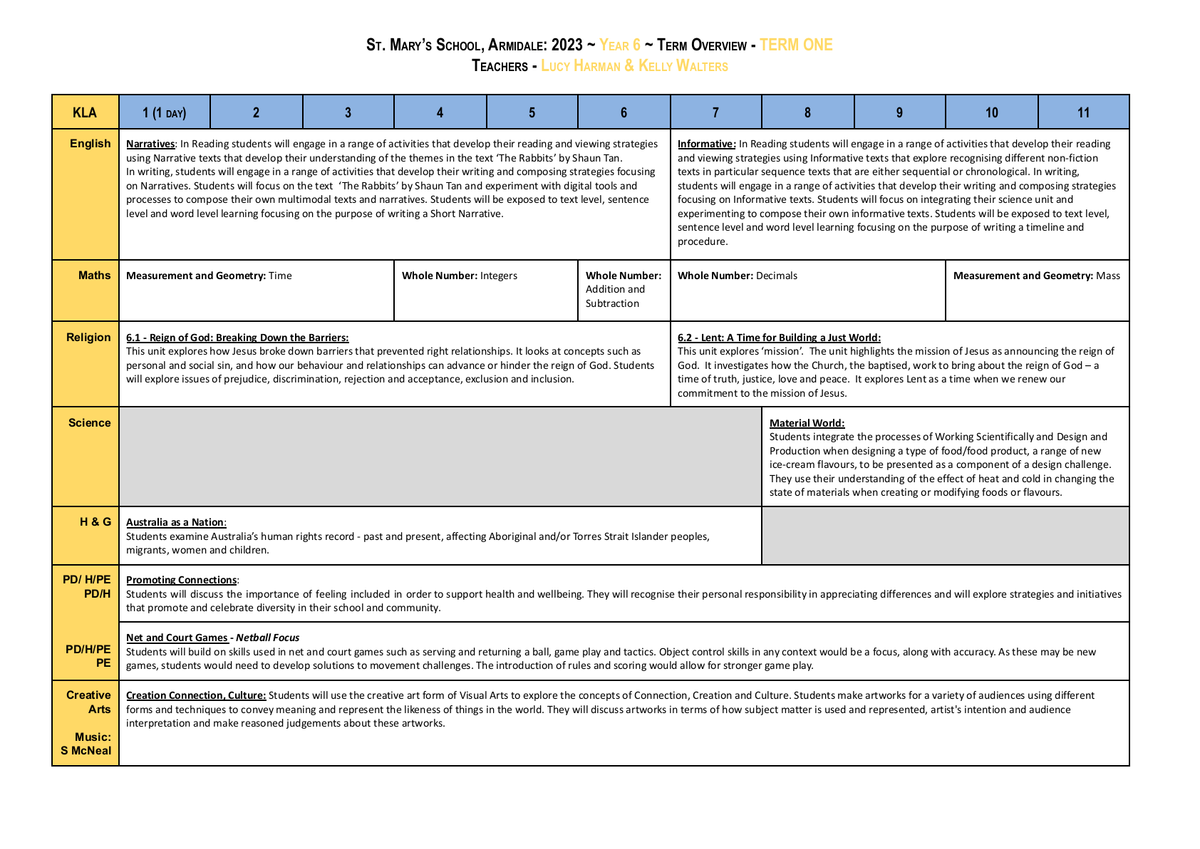K - Yr 6 Learning
Term 1 Overviews & PM Readers

K - Yr 6 Learning
Term 1 Overviews & PM Readers
READING LEVELS EXPLAINED
The formal reading assessment tool we use at St Mary's is the PM Benchmark system (with levels from 1-30). The books are designed so that with the earlier levels (1-14) the difficulty/ challenge between levels is generally minimal, therefore children can gradually move through these levels in small steps. The next range of levels (15-24) sees greater challenges and larger steps between each level, so progression through these takes longer. And the final range of levels (25-30) involves significantly greater challenges and much larger steps between levels. Progression through these upper levels takes a much longer time; often children remain on the same level for up to six months.
WHY IS MY CHILD BRINGING HOME READERS OF A PARTICULAR LEVEL?
Parents need to know that the ‘home readers’ your children bring home are based on what is known as their ‘independent level’. This means that the books are not meant to be too challenging. The purpose of ‘home readers’ is for children to enjoy reading and develop confidence as they practise their skills at home with their parents. At school however, the teachers work specifically with your child at a more challenging/ higher level known as their ‘instructional level’.
HOW DOES SCHOOL TEST READING AND KNOW WHEN TO MOVE A CHILD UP A LEVEL/S?
Parents are often not aware that there is so much more to assessing a child’s reading than simply hearing them read a book. Whilst teachers informally hear your child read every week during guided reading sessions, they formally monitor and test your child’s reading through a very explicit and complex process (known as conducting a ‘running record’). This detailed assessment takes up to 20 minutes for each child. Through careful analysis and by applying numerical formulas, they can then determine a child’s ‘instructional reading level’. Our teachers are experienced and trained in assessing and analysing a wide range of technical elements of reading such as:
In short, even if your child’s progression through the levels appears to take time, rest assured that they are receiving quality reading instruction every day at school. We hope this information assures you that there is more to your child’s reading development than the number on their home readers.
Please don’t forget to continue to enjoy the simple pleasure of sharing a book of any description with your child.....just for the love of it!
Talk is essential to writing. Children can only write using language that they know; words they can confidently verbalise and understand.
Words empower children to make sense of the world around them. A wide vocabulary helps them to put their emotions into words, socialise with people, imagine and wonder. According to Deslea Konza from Edith Cowen University in Western Australia, the size of vocabulary, that is, the number and variety of words that children know in the preschool and initial years of schooling, is a significant predictor of reading comprehension in the later years of schooling and of broader academic and vocational success.
Picture books are a great way to support speech and language development. When reading aloud to your child, look for and discuss new or unusual words and explain what they mean. Put the word into a sentence or discuss other words that mean the same (synonyms). For example, in the picture book 'Wilfred Gordon McDonald Partridge' by Mem Fox, one character describes a memory as "Something as precious as gold...". This provides the perfect opportunity to encourage language development with the word 'precious'.


If a child can't say it, they can't write it.
In K-2 at St Mary's, we follow a program called Initialit. This program, created by runs for one hour each day in the English block. InitiaLit is an evidence-based whole-class literacy program providing all children with the essential core knowledge and strong foundations to become successful readers and writers. InitiaLit is a three-year program, covering the first three years of school (Kindergarten to Year 2).
Initialit teaches the alphabetic code very thoroughly for reading and spelling but it has an equally strong language and vocabulary focus through a ‘storybook’ component. InitiaLit K/1/2 addresses all five key components for effective instruction: phonemic awareness, phonics, fluency, vocabulary and comprehension. The program is uniquely placed to be effective because they are all grounded in scientific, evidence-based best practice.
You will hear your child talk about learning intentions and success criteria at school. This is used as a common language to guide the learning across our school. Our learning intentions are set at the start of each lesson or unit of work and discussed with the students in regards to ‘what are we learning today’ in that particular lesson or lessons. This aligns with the common language being used in our Armidale Diocesan schools.
The success criteria is used to assist students in how they can achieve the learning intention. Most of the time it is co-constructed so the students understand ‘what the teacher is looking for’ and what meeting the learning intention looks like for them. A great question that you can ask your child after school is what did you learn today? This is powerful, as it allows your child to focus on the learning that took place during the day and explain their understanding to you.
Maths
Units taught are: time, 2D shapes, whole number and length.
Religion
Prayer spaces, Lent and Holy Week. We are learning the Sign of the Cross and Grace.
Science
Living things
Geography
School places
Creative arts
All about me
Homework will be started once we have begun reading in class. The process for this will be sent out on a compass notification when you child receives their home reading folder.


Home Readers
Return to school on Wednesday and returned home on Thursday with Talk Homework.
Library Borrowing
Library books in library bags returned to school on Thursday, borrowing and returning home on Friday.
RELIGION
During Religion lessons in Term One we will be looking at “Images of God” where students will demonstrate a growing familiarity with Scripture stories. Students will also recognise that God is present in their lives, the lives of other people, the Church and the whole of creation. Students will also become familiar with some formal prayers.
We will also be studying “Lent and Holy Week” where students will demonstrate a growing familiarity with Scripture stories and also identify the key times of the liturgical year.
ENGLISH
In English lessons this Term we will be studying imaginative texts, including writing them, the features, the purpose and examples of imaginative texts.
Every Friday we will be writing our “Big Writes” so we will be sending home “Talk Homework” every THURSDAY. Year Two also have their Home Readers changed every THURSDAY too. We also encourage you to PLEASE listen to your child read every night.
MATHEMATICS
In Mathematics we have been learning all about “Time”, including days of the week, months in the year, seasons, the duration of an event, quarter to and quarter past the hour. Next week we will be moving on to “Whole Number” and then “Two-dimensional Spatial Structure”.
SCIENCE – Weeks 2-6
“Earth’s Resources” is the unit that we are studying in Science lessons. We have been looking at the Earth’s resources and how we use and care for them.
HISTORY – Week 7
In Week 7 we will be starting the topic “Past in the Present” where we will be able to identify and describe significant people, events, places and sites in the local community over time. We will also describe the effects of changing technology on people’s lives over time.
IMPORTANT DAYS TO REMEMBER
Text Details | Types of texts Narrative Persuasive Students independently read, view and respond to familiar and challenging texts and justify interpretations of ideas, information and events using a range of skills and strategies. They recognise the representation of characters, settings and events in imaginative texts and start to evaluate point of view. They explain some ways in which authors and illustrators engage the interests of audiences and achieve a range of purposes. Students create well-structured imaginative texts in terms of topic, purpose, audience and language by drafting, proofreading and editing for familiar and unfamiliar audiences. They use simple and complex sentences, paragraphing, punctuation and grammatical features characteristic of the various texts to support meaning.
|
Data Whole Number Position Addition and Subtraction
| |
3.1 - Created by God a gift to share 3.2 - Lent A time for reaching out in love | |
Material World How do materials change when heated and cooled? | |
| History: Community and Remembrance | |
| Students will have the opportunity to practise skills in fun and challenging situations and through common games and activities. Students learn about and practise using an implement to strike an object at targets, learn about and practise striking a ball to score runs against the fielding group. Batters learn about and practise striking a ball with an implement while working with others to score points. Fielders learn about and practise fielding a ball to prevent the batter from scoring points. | |
| Students will explore a range of challenges they may be presented with and will recognise how being persistent builds resilience. They will investigate a range of responses and strategies to deal with challenges and different situations in order to build their capacity to respond appropriately in the future. | |
Visual Arts/ Dance/ Drama This unit has a strong focus on appreciating activities and offers students a range of experiences in artmaking and elements of drama. It considers how artists respond to events of significance in their own time and from other times.
The focus is beauty, interest, awe, wonder and the use of perspective and composition to convey emotion. Selected artists, including Ron Brooks, Marc Chagall, Pieter Bruegel the Elder, made artworks about the people, the environment, the tools, and the experiences that had — and continue to have — symbolic meanings for audiences today.
The styles and concepts associated with these artworks are also considered in terms of their relevance to practices in art.
Making activities focus on students’ development of skills in a range of techniques, including observational drawings, and colour and tonal mixing, further extending their understanding of concepts that can be applied in artmaking.
The unit also provides opportunities for students to engage in research about selected artists. |
IMPORTANT DAYS TO REMEMBER
| Religion | This unit explores "the law of love". It begins by recalling with students the purpose of rules in groups and communities. It then examines the Ten Commandments, focussing on their purpose and principles for living in relationship with God and each other. This forms the basis for introducing and exploring Jesus' 'new commandment' with reference back to the Commandments. The unit leads to a deeper understanding of how the Commandments and Jesus' 'new commandment' guide us in living in relationship with God and others. This unit focuses on the Liturgical Season of Lent as a time to reflect on how we live our lives. It explores choices and their impact on our growth and conversion. It teaches about the sacrament of Penance. The unit then reviews the events of Holy Week through the Scriptural Stations of the Cross. |
| English | The text types for reading and writing this term are Narratives weeks 1-6, and Persuasive Texts weeks 7-11. Spelling activities such as LSCWC, dictionary definitions, writing compound and complex sentences including list words and a VCOP strategy are used each week. Handwriting and Grammar are modeled and taught explicitly throughout the week. Reading strategies such as Making Connections, Visualising, Inferring, Monitoring, Questioning, Summarising and Paraphrasing will be taught and used throughout the term. |
| Maths | Chance and Data, Whole Number, Position, Length and Addition and Subtraction |
| HSIE | History - Learning how to describe people, events and actions related to world exploration and its effects Learning how to describe and explains effects of British colonisation in Australia Learning how to apply the skills of historical inquiry and communication |
| Science | Students identify the physical properties of materials They investigate the suitability of natural and manufactured materials for specific purposes Students will create a package that is designed to keep an Easter egg safe in the post, choosing protective materials to wrap the package in. |
| PDH/PE | PE - Net and Court games: Tennis focus PDH - Students will identify roles, rights and responsibilities in different relationships, exploring how they can influence theirs and others emotional and social wellbeing. They will recognise types of abuse and bullying behaviours and will practise strategies they can employ when they themselves feel unsafe or they see others in need of assistance or help. |
| Visual Arts | A combined Year 4 Artwork for the Armidale Show Two individual artworks for the School Art Show which is early Term 2. One focus will be on Vincent Van Gogh - Starry Night and Jackie French’s Fire and Flood. |
English Writing Week 2 - 5:
Imaginative Texts
Students will write a range of imaginative texts from their own ideas and from stimulus.
Students will identify and construct narratives using the correct structure.
English Writing Week 6 - 11:
Persuasive Texts
Students will write a range of persuasive texts from their own ideas and from stimulus.
Students will identify and construct persuasive texts using the correct structure.
English Reading
Week 2 - 5 Reading Strategy :
Making Connections
Students will read, and be read, a range of different texts and make text to self, text to world and text to text connections.
Week 6 - 8 Reading Strategy :
Questioning
Students will read, and be read, a range of different texts and asked a range of comprehension questions. They will also examine texts to understand how to find the answers.
Week 9 - 11 Reading Strategy : Sumarising
Students will read, and be read, a range of different texts and be asked to write and verbally provide a summary of the text.
Mathematics
Week 2 - 3: Time
Students will use 24-hour time and am and pm notation in real life situations, identify the time using digital and analog clocks, compare 12- and 24-hour time systems and convert between them, determine and compare the duration of events, read, interpret and use a timetable and solve problems relating to time zones in Australia.
Week 4 - 5:
Place Value
Students will recognise, represent and order numbers to at least tens of millions.
Week 5 - 6:
Addition & Subtraction
Students select and apply appropriate strategies for addition and subtraction with counting numbers of any size.
Week 7 - 9 :
Decimals
Students will compare, order and calculate with fractions and decimals.
Week 10 - 11 :
Mass
Students will measure, record, compare and estimate the masses of objects using kilograms and grams .
Religion
Week 2 - 6 : The Reign of God: Reaching out in Justice.
This unit explores the Church’s mission to build a just world. Students will explore examples of injustice and how the Church continues the mission of Jesus by working for justice.
Week 7 - 11 : Lent a time for Growth
This unit explores the season of Lent as a time of conversion and growth. It presents Jesus’ passion as an experience of suffering and rejection. It also looks at Jesus’ response to a person suffering rejection.The Church’s celebration of the events of Holy Week will be presented and explored.
Science
Week 3 - 8: Space
Inquiry Question: How does the Earth compare to other planets in the solar system?
History
Week 9 - 11 (continued in Term 2) : Colonies
Students describe and explain the significance of colonial people and events to the development of Australia.
Homework
Every Thursday we will be writing our “Big Writes” so we will be sending home “Talk Homework” every Tuesday. Year Five have a reading log that we encourage the children to fill in each night with the current book they are reading. We also encourage you to PLEASE listen to your child read every night and sign off their reading log. On the student's Google Classroom we have also added in links to NAPLAN resources for you to access with your child to utilize for practice before the upcoming tests later in term 1.


Teachers welcome contact from parents, if you need to talk with staff please either contact the class teacher by phoning the school – 67724441 or email the school on smaadmin@arm.catholic.edu.au